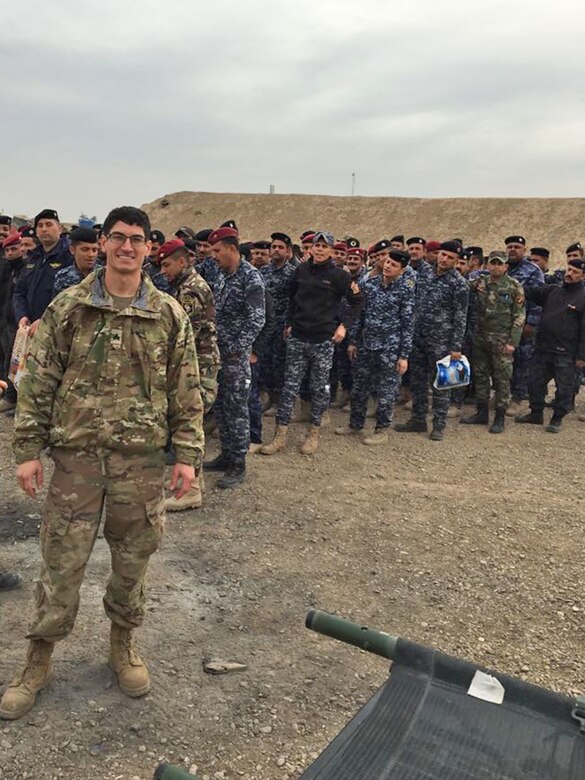By Army Sgt. Dennis Glass, Combined Joint Task Force
Operation Inherent Resolve
SOUTHWEST ASIA -- Army Sgt. Kyle Nusbaum was teaching combat
lifesaving skills to a class of Iraqi Federal Police recruits when their
classroom skills actually enabled them to save lives.
A loud explosion near the classroom didn’t seem unusual,
because he was teaching at a clinic near a training site. But moments later,
someone rushed in with horrifying news: a gas tank had exploded, and there were
casualties.
The Federal Police students met victims of the explosion in
the walk-in area of the clinic and put their first-aid skills to use, applying
tourniquets and evaluating the victims for more injuries. One victim arrived
with partial amputations to both legs, and the students were able to stop the
bleeding, stabilize with intravenous fluids, and arrange for transfer of the
casualties to the 47th Combat Support Hospital at the Baghdad Diplomatic
Support Center for further care.
The Italian Carabinieri, another coalition partner with an
integral role in training the Federal Police, coordinated the triage and
transportation of the injured personnel. The Carabinieri’s control over the
chaotic situation allowed the students to help the victims.
Medical training that coalition forces provide to their
Iraqi partners saves lives, and it is on track to save more. Nusbaum, a combat
medic assigned to Task Force Medical 47, was able to witness his students use
the six months of medical training they had received to save lives in the very
facility where they received their training.
Fast Response
“It was one of the fastest response times I’ve seen for
transferring a patient. Their knowledge of the skills, and their application of
those skills in a timely matter, absolutely contributed to getting them to the
CSH that quick,” Nusbaum said. “Twelve months ago, if that patient had come
into this clinic, I doubt they would have made it out alive.”
Task Force Medical 47 operates under Combined Joint Task
Force Operation Inherent Resolve, the global coalition of nations and partner
organizations that advise and assist partner forces in Iraq and Syria.
The Iraqi Federal Police began their medical training after
members of the medical task force were invited to observe and grade a basic
combat lifesaver skills demonstration. But task force members felt it was
inappropriate to grade the students without witnessing the training the
students had received. Subsequently, Task Force Medical 47 was invited to
assist with the medical training.
“The theater mission, from our understanding, was to help
create a local national force that was self-sustaining and self-sufficient,”
said Army Sgt. 1st Class Thomas Kelley, noncommissioned officer in charge of
the emergency medical treatment team at the 47th Combat Support Hospital.
Kelley said the question asked by the chain of command was; “If this is
supposed to be self-sustaining, why are we just teaching [combat lifesaving
skills]? Why don’t we teach a CLS instructor course so that the local Federal
Police can now teach themselves?”
Army Col. Robert Howe, then the commander of Task Force
Medical at the Baghdad Diplomatic Security Center, approved training for
intermediate and advanced medical courses, which would qualify the Iraqi
policemen to instruct others. Kelley, along with key members of Task Force
Medical 47, were instrumental in developing programs of instruction that
provided a detailed description of the course and phase content, duration of
instruction, and resources used to conduct the class.
Self-Sustaining Training
Several members of the Iraqi Federal Police have completed
the advanced course and are now qualified to teach the basic combat lifesaving
skills course and see patients in their own clinic.
“I have Iraqi Federal Police instructors training CLS for
the Iraqis, saving lives for the Iraqis. That’s self-sustaining. That’s why we
are here,” Kelley said. “We can teach anybody, but having somebody take that
instruction and apply it, and then to share that knowledge with their
counterparts -- what that does is keep us from having to come back and do this
again and again and again.”
Coalition combat lifesaving skills training of partner
forces does not stop with Task Force Medical 47 and the Federal Police. Army
1st Lt. Daniel Gebhardt, a physician’s assistant at the Camp Union III clinic
in Baghdad, said 12 members of the Iraqi army living at Union III were trained
in basic combat lifesaving.







No comments:
Post a Comment